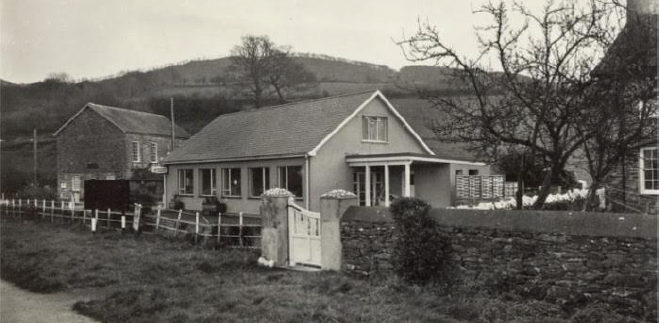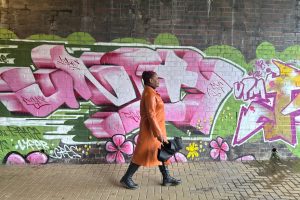
AN EXCITING new change is well underway for the people of Machynlleth and the wider area, which will guarantee to brings smiles all round.
After establishing in 2011, May 2013 saw the new Cletwr in Tre’r Ddôl spring back to life, with the Siop Cynfelyn and Caffi Cletwr opening their doors to the public and becoming more popular than ever.
Taking into consideration the building errors of the rent-free property, a small group of volunteers at Cletwr then set a target to raise enough money through local funds and applications to create a sustainable building as an alternative.
With the brand new building set to open by summer 2017, the community will be able to look forward to a modern and environmentally sound building which will hold a larger shop and cafe, a meeting room and offices to support community activities.
In addition to that, the building will even have solar panels to further reduce energy.
Cletwr has been very fortunate to have a wide range of funding from various sources, including £497,000 from the Big Lottery Fund, (of which about £300,000 went to buy the site), £172,000 from a Welsh Government grant and £88,000 from an EU grant.
There have also been smaller grants given to them by Ceredigion County Council, Trusthouse and donations from locals.
November brought even better news for Cletwr as they received a letter from the EU Rural Communities Development Fund, stating that all of the funding for the new build was officially in place.
North Ceredigion is known for being a relatively poor area and, with that in mind, one of the main aims of Cletwr is to tackle various issues affecting our community such as isolation, lack of services and poverty.
The Herald was able to interview the newly appointed Chair of Cwni Cymunedol Cletwr, Nigel Callaghan, where he was able to explain about the on-going development in greater detail: “Cwmni Cletwr was originally established in 2011, with the simple aim of re-opening the old Cletwr Services in Tre’r Ddôl as a village shop and cafe.
“The shop and cafe duly re-opened in Spring 2013, staffed mainly by volunteers. The owners of the site let us have the property rent-free for over 18 months, to help us get established. But then it got complicated – we became very popular!
“At that point, we decided to aim a bit higher, and seek funds to buy the site for the community and to build a replacement building; the existing one has a number of structural and environmental problems, and a new building could be an example of sustainable building.”
He continued: “We considered renovation of the present building as a cheaper alternative, but it would have meant closing for many months.”
Describing the inspirations behind the project, Nigel said that it was to ‘build a stronger and better community’. “When we started, the community had lost virtually all its services: shops, cafe, Post Office and petrol station all closed.
“Since then, we’ve also lost the school and the church. All that was left was a pub, a chapel, and a village hall. People had few or no opportunities to meet their neighbours. The community was in danger of becoming a dormitory.
“Initially, we aimed for the shop and cafe, but the scope of the project has now grown. We became aware that we could and should aim to provide far more than a shop and cafe, so instead we aimed to provide a wider range of services and facilities to tackle many of the problems associated with life in a rural area.
“Recent studies show that over 20% of the children in the community live in poverty. We do not think that is acceptable and through Cletwr we, as a community, can start to do something about that.”
We went on to talk about one of Nigel’s blog entries, where he said that ‘there should be some nice landscaping too, making the whole place a worthy ‘Gateway to North Ceredigion”. From that, Nigel described to us in detail about what people are able to look forward to with the new building: “The new building will be a model of sustainable building: highly energy-efficient, generating (hopefully) more electricity than it consumes.
“Our architect, Arwyn George of George a Tomos, Machynlleth, has ensured that it will be an attractive and interesting building.
“The old Cletwr services were a familiar and popular stop for travellers on the A487 for decades, and the new Cletwr is no different. It’s a convenient stop for coffee, a bacon sarnie and clean toilets, and a chance to buy a last minute present for Auntie May.
“We will also be extending the facilities for tourists, with more information about the immediate area, but also Ceredigion as a whole, and encouraging visitors to stop and spend money in the county!.”
“In your blog, you say that the Big Lottery, Welsh Government and the EU, plus Cyngor Ceredigion and Trusthouse, have all contributed costs towards the development. What were the procedures behind this and how would you encourage the public to continuously support the development?” we asked Nigel. He answered: “None of this would have been possible without considerable support from many organisations – public and private, large and small. One lesson that we have learned is that there are a lot of sources out there for funds for worthwhile projects, provided the aims of your project match theirs.
“People have questioned whether what we are doing is the best use of half a million pounds and whether it could be better spent on Bronglais. Undoubtedly, we all want more money spent on Bronglais, but it’s the Welsh Government that decides how to spend the money.
“They earmarked a fund for addressing poverty and deprivation and that’s what we received money for. Rural poverty is just as real as urban poverty, even if it is more subtle.”
“The funding wouldn’t have been possible without incredible work by several of our volunteers, who have invested weeks, even months, of their time, unpaid, identifying sources of funding, preparing the applications, and responding to questions.”
Nigel further added: “Some applications failed. Many involved very detailed written plans, running to dozens of pages. And once the money has been allocated, considerable time is spent doing the paperwork afterwards. The money is there but don’t underestimate the effort required to get it.”
Nigel then went to talk about one of his blog entries, where he said that one of the aims of the building is to tackle a number of issues affecting the community. Regarding this, we asked him what ways he believes the building will benefit in bringing the community together: “The impact of Cletwr, as a shop, cafe and community hub, is already being felt. We have over 50 regular volunteers, of all ages, helping with a wide range of activities, from serving in the shop and cafe, to baking award-winning welsh-cakes, cutting the grass and sorting out the WiFi.
“It’s already a place where people in the community meet up for coffee or attend one of our frequent events – the walks are very popular. A common comment from people is that there is a ‘buzz’ about the place. People stop to actually talk to their friends and neighbours.
“We organise activities that support Welsh in the community, including regular sessions for learners to mix with fluent speakers and develop their language skills. We also offer a free library of Welsh books for people to borrow.”
Nigel further explained: “Parents of young children like to meet up there as they can have a coffee and some homemade cake in a child-friendly space, with a proper play-area, well equipped with toys and books. The new building will allow us to offer a wider range of services, activities and products in the shop, providing even more reasons for people to call in and get involved.
“The shop, under the skillful management of Karen Evans, is already attracting customers who specifically call in because of the range of products, including many local and Welsh items.
“One of the most important aspects of Cletwr is that in involves all parts of the community: young and old, working and retired, incomers and people who have lived here all their lives, Welsh-speakers and non-Welsh speakers.
“Before we had Cletwr, there were few opportunities for people to mix. People talked about ‘community’ but that was just a geographical idea. With Cletwr, the idea is becoming a reality.”
Continuing his emphasis on how the building will benefit the community, Nigel added: “Cwmni Cletwr has been set up as a non-profit group. Any surplus we make will be invested back in the community, helping other groups within Taliesin and Tre’r Ddôl and the surrounding area, not just kept for Cletwr activities.
“With never-ending cuts in funding for local services, it is clear that communities will need to become more and more self-sufficient. A local community company can be a good starting point for this, but it requires dedication and effort from many people in the community.
“Of course, it’s not compulsory for people to volunteer in the shop to be a supporter; people have many demands on their time – work, family, health – and simply coming in from time to time to use the shop and cafe is just as important as helping with the washing up.
“Too many villages in Ceredigion, and throughout Wales and the UK, have turned into ghost towns as their shops and services have closed. Many are now starting to fight back.
“We’ve had a lot of help and advice from the Plunkett Foundation, who advise community groups on running businesses. Many already exist in Wales, from groups running a shop for a few hours a day to others who have taken over the village pub and Post Office.
“With services available again, it becomes worthwhile for people to think about leaving their homes during the day to use them. No need to take an expensive bus into town to go shopping.”
Nigel concluded the interview by telling The Herald:
“Our long-term aim is to ensure that there is a long-term future for our community. Through Cletwr and other activities, we want to make Llangynfelyn somewhere that people will want to live, somewhere where they can work, raise a family, and eventually live out a comfortable retirement, surrounded by a supportive community of friends and family.”
















Add Comment